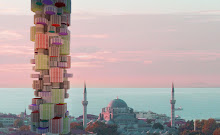Fourteen years have passed since genocide tore through the human fabric of Rwanda. Such an inconceivable trauma takes time to heal but that is not stopping Rwandans from moving forward with incredible speed and determination. A new master plan is being designed for the capital city of Kigali as part of the greater plan to transform Rwanda from an agrarian economy (92% of its population are subsistence farmers) to an information economy. The country's Vision 2020 development agenda aims to turn the population of Rwanda into a knowledge based society with a vibrant class of entrepreneurs. Using east Asian countries as a model, Rwanda is hoping to become the Singapore of Africa.
But how is this possible - when 52% of the population still lives below the poverty line; only 5% of the population has steady access to electricity; life expectancy is hovering around 46 years of age; 175,000 women and girls are infected with HIV from rapes during the genocide; 400,000 women have been widowed; 100,000 men are imprisoned for their role in the genocide and families have been decimated? (In just a 100 days in 1994 1 in 10 Rwandans were murdered). Well, meet Rwandan President Paul Kagame. He is leading with a determination and vision unlike any African leader. However, armed with a strong conviction and singular vision of achieving these goals, he has implemented some rather contradictory laws and developments. President Kagame has made honest governance and security critical; has promoted education and healthcare; and aggressively advanced the rights of women in public and private life. He has also outlawed all opposition.
Welcome to the unusual economic and social miracle that has become Rwanda.
Up until 1994, the majority of women in Rwanda did not work outside the home, did not own property and were instead viewed as property. In May 2003, Rwanda voted in a new constitution, allowing women to own property and reserved at least 30% of the seats in Parliament for women. As a result, in the first national election since the genocide, 48% of the seats of Parliament were won by women (39 out of 80). 36% of Kagame's cabinet positions are also held by women. Rwanda now leads the world in representation by women in a national legislature.
Most Rwandan women, left alone to pick up the pieces and support not only their own remaining family members but thousands of orphaned children after the fighting died down, have also managed to start businesses with an infrastructure not created to support them. Today 41% of businesses in Rwanda are owned by women. For the first time in Rwanda's history, women are taking charge and developing new skills to move forward.
In addition to this dramatic political and socio-economic advancement, Kagame has transformed Rwanda into the safest country in Africa. His administration has also waged a comprehensive campaign against bribery and influence-peddling in government.
Since 2004, Rwanda's economy has grown at an average rate of 6%. Economists, diplomats, development experts are all full of praise for what Kagame has already accomplished and still plans to accomplish. Archbishop Desmond Tutu has called Rwanda "a miracle unfolding before our very eyes."
But there is also a more ominous side to this positive development. Kagame's last election that he supposedly won with 95% of the vote is rather suspect. He has allowed no real opposition foster. Judicial independence has been compromised. Free speech and freedom of press does not exist. And while Kagame advocates one Rwanda, he purposefully squashes lingering sentiments of sectarian politics for his own benefit - cementing his rule.
It is a known fact, although often overlooked, that without sound economic development it is extremely tough to heal a society violently ripped apart by civil war, or worse still, genocide. Old wounds cannot start to heal if people cannot feed their families or provide them shelter and have no hope for the future. It is also absolutely critical that women hold positions of power and leadership, if they are to over turn the mindset that allowed the mass raping of women and children. Perhaps without the dictatorial methods of President Paul Kagame, Rwanda would not have progressed as far and be hailed as the hope of what is possible in Africa. After such unthinkable horrors, and utter lawlessness during genocide, perhaps a rigid, even authoritarian framework is necessary to rebuild security and a new socio-economic structure. Where must the line be drawn between development and progress and free speech? And given that women's rights are human rights then Kagame can both be praised and demonized for his approach towards the rights and freedoms of his people.
Subscribe to:
Post Comments (Atom)

































No comments:
Post a Comment